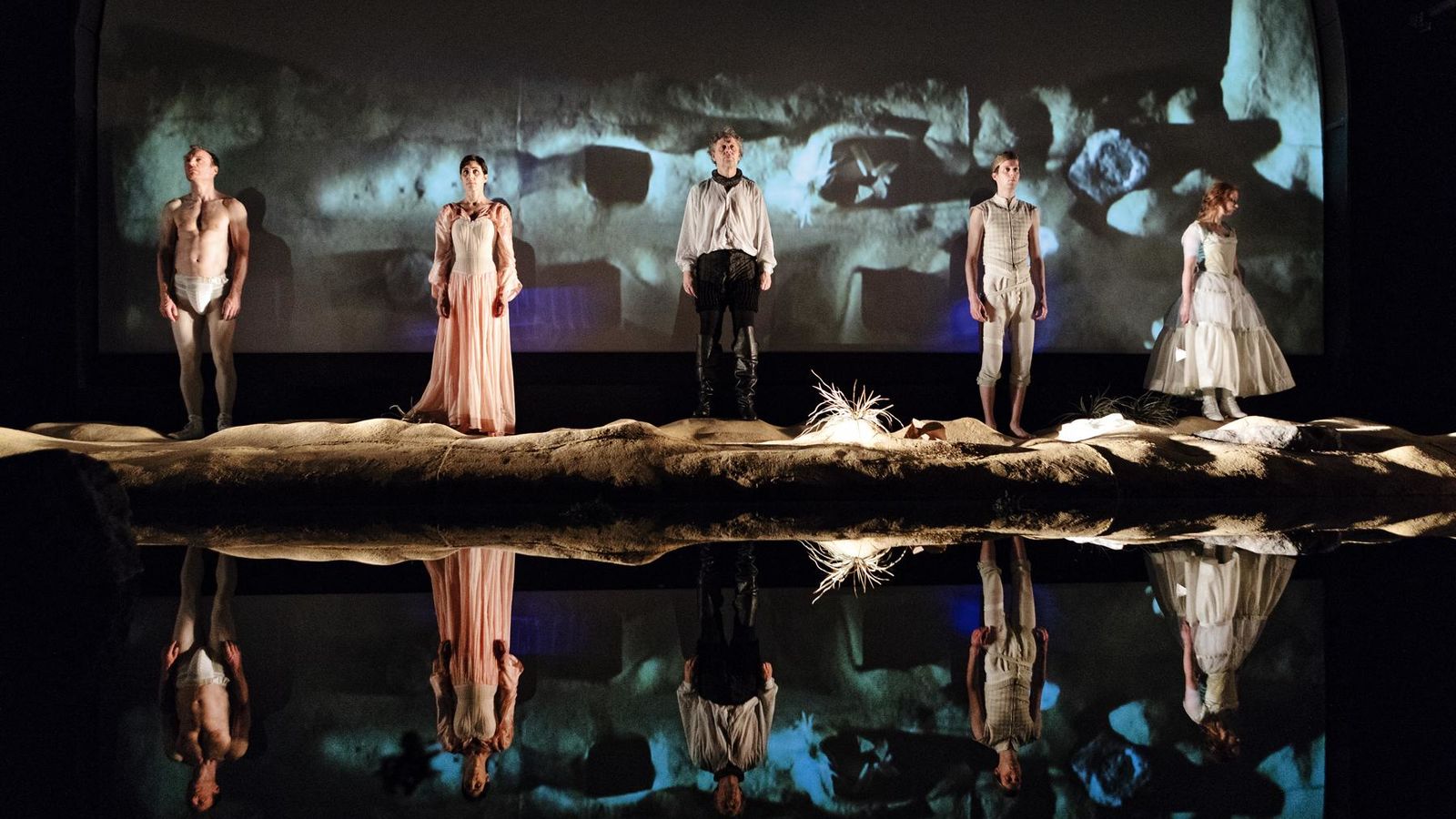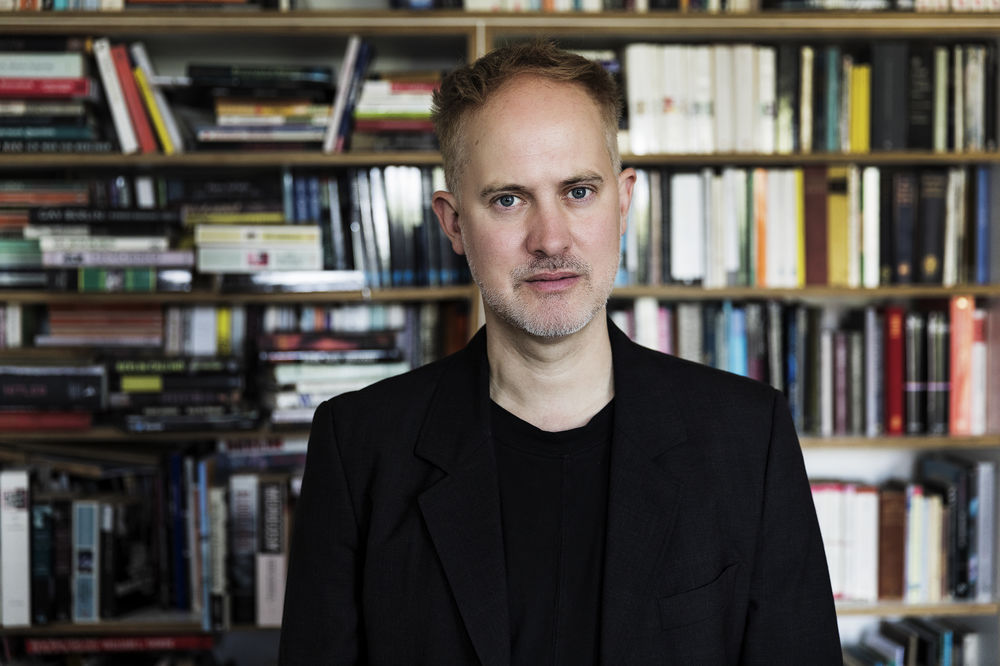
Shipwrecked with Dead Centre and »Shakespeare’s Last Play«
by Joseph Pearson
23 April 2018
Dead Centre, based in Dublin, comes to the Schaubühne with »Shakespeare’s Last Play«, loosely based on »The Tempest«. I arrive on the set in Saal C. Of course, a Shakespeare-inspired production is taking place in Berlin’s reproduction of The Globe Theatre. Before me is a sandy seashore, strewn with rocks positioned it seems in a Japanese Zen garden. The technical team are setting up a GPS system, which will follow the actors’ movements, even when they are not on the stage. The directors, Ben Kidd and Bush Moukarzel, are making adjustments; it’s their first day with their play on Kurfürstendamm, having moved the whole set just yesterday from the practice stage.
Then the actors appear. Mark Waschke pursues Jenny König along the shoreline, tries to seduce her, rushing through the water. Then, failing, he drags her by the hair to the beach. She cries. »Don’t! « she warns, »My father is watching«.
»The Tempest«, of course, is set on an island, where the shipwrecked wander, beset by magical creatures and spells. Written in 1610, as the Bard’s last opus, the play sees a usurped Duke, Prospero – the puppeteer of those who land on his island – ultimately relinquish his powers. With this gesture, Shakespeare too may have been self-consciously saying farewell to the stage.
»We have doubled down on autobiography«, Moukarzel explains to me later in the café, »Prospero as Shakespeare’s persona. The relinquishing of his magical powers, which can transform human behaviour, is a reflection on Shakespeare’s talents: what is the power of art? How can it edify human behaviour?«
»Meanwhile, directing is already written into the play«, he continues, »Prospero and his dramaturgy of the characters is already a conversation about directing, about authority and human freedom. These questions in the play want to be dealt with, interpreted, and given a conceptual turn«.
I suggest, »»The Tempest« strikes me as a play that demands fiddling. It’s such a strange play, isn’t it? You would think a story involving a storm, a shipwreck, then vengeance on a usurping brother who has taken your Dukedom, would promise a revengers’ tragedy. But »The Tempest« turns instead tragicomic, even – to quote one contemporary critic – »mongrel«. Instead of tragedy, we get comedy. Instead of revenge, we get forgiveness«.
Ben Kidd nods, »I think »The Tempest« is a very disappointing experience. Structurally, it is a bit of a mess. I don’t think it’s that good of a play. And so we do it bendy, not straight. We simplify it: reducing the number of characters and focusing the scenario: people on an island being punished, an island that is the theatre. Because, no matter how strange this play might be, you can mine things from it. Joy, maybe. But – perhaps more compellingly – misanthropy. It’s there: the ambiguity or the grumpiness of this Prospero character, who doesn’t want to do this anymore, but it’s all he can do«.
Bush adds, »Obviously we are not putting on »The Tempest«. And we make some important cuts. Prospero, Caliban, and Arial are the three reasons to do this play. And we cut all of them. We want instead to focus on the mortal and banal supporting characters. Call it our perverse interest: to take the only reasons to do the play, and remove them. We did the same with our production of »Platonov« when we cut the main character«.
I comment that one striking aspect of »The Tempest« is, of course, the role of magic, a subject of controversy in Elizabethan and Jacobean England. Prospero wields sanctioned »white magic«, while the witch Sycorax’s gifts are occult. How, then, will magic play out here?
Moukarzel cautions, »I don’t want to sound too much like Edward Snowden, but the technological innovations of the piece have a »sense of magic« about them«.
»Prospero uses his magical powers for surveillance, to track the characters in this play. We use GPS tracking for surveillance, authority, and manipulation. The GPS is a charming element of the show – like headphones or commentary in our previous productions, such as in »Chekhov’s First Play«. The concept is simple: the actors will have tracking devices. They have been extremely hard to acquire and use, because while the technology is roughly accurate in the street, it is difficult to make precise down to a few metres in the theatre. But we hope that the GPS provides the audience with omniscience. Allows them to share Prospero’s omniscience. Dramaturgically, this joins up to the question of authority and control. Prospero tracks the other figures, Shakespeare shapes his characters as a playwright, while the audience is also able to surveille these controlled people«.
»In a way, that is the magic of the island, at the heart of it«, Moukarzel continues, »Magic is not like an angel flying through the air. Instead, we have the process of the theatre that makes people perhaps sympathise, feel moved, when considering the ethics of how the characters are manipulated, by questioning how theatre makes money out of suffering, or tells stories out of despair, and presents acts not done for people’s edification«.
I suggest that it is perhaps serendipitous – if that is the correct word when speaking of the mass invasion of privacy involving Cambridge Analytica – that Facebook data leak, complete with congressional testimonies, is the topic of the month as the production (about privacy and tracking, among other subjects) premieres.
Bush smiles, and says, »Well, we don’t want to get too »zeitgeisty« and make false claims about the significance of this play! But it’s true that something has shifted with the use of this technology. When you think about the history of mapping, historically you weren’t mapped. The world was mapped. But these technologies, using GPS, have put us in the foreground, and the world in the background. Isn’t this a bleak portrait, of where are we? We don’t care where Germany, or Syria, or Lampedusa are located. We care where we are located. A poetic resonance comes from this, which we are pursuing«.
»Poetic resonance?« I ask.
»Yes. The technology is just a point of access for the audience, to move them into realms of consciousness, to the voice in their heads. Perhaps you will meditate about the self, about presence, or why one goes to the theatre – why you are sitting here, in a blind cultural practice of looking for something. It’s the same as these people on the island who ask: why are we here? Perhaps we find, despite the GPS, that we are utterly lost«.
»Thinking about a »last play«, I couldn’t help but think of the theorist Edward Said’s work on »Late Style« – «
Bush picks up my thoughts immediately – »Yes, but if you remember in Said’s book, he passes over »The Tempest« because it was too harmonious. For him, there was too much resolution in the play’s resolution. »The Tempest« is described, after all, as a comedy. Said favoured instead disharmony, admitting that the world moves on without you. If we’re looking for intransigence and difficulty, then »King Lear« would be the real last work. It’s when the story breaks, the world breaks, and everything gives way. No one wants to be King. Think of the last lines, how, compared to the old, the young shall never see so much nor live so long«.
»How then do you conclude?« I ask.
»We try to restore an ending to »The Tempest« as a last play. The ending that should be there but is not. One that is about disharmony and catastrophe, that provides a sense of endlessness. How should things end? Well, they don’t, just as Shakespeare’s project is a never-ending event. We are all going to the Island to do Shakespeare, to the author to understand ourselves better. But then we find ourselves in circles, not going anywhere. There is an attractive quality to that: to see that people don’t learn. That they go on great journeys, passing through time, through a series of atmospheres, and instructions. Maybe there is nothing to understand. That’s close to the point. As Adorno suggested about »Endgame«: there’s nothing to say about »Endgame«, it’s a place you go. A shipwreck, then we go to the Island«.
Shakespeare’s Last Play
by Dead Centre
after »The Tempest« by William Shakespeare
Direction: Bush Moukarzel, Ben Kidd
World Premiere
Globe
Premiered on 24 April 2018
Mit dem Aufruf des Videos erklären Sie sich einverstanden, dass Ihre Daten an YouTube übermittelt werden. Mehr dazu finden Sie in unserer Datenschutzerklärung.
Bei Klick auf die Schaltfläche "Akzeptieren" wird ein Cookie auf Ihrem Computer abgelegt, so dass Sie für die Dauer einer Stunde, diese Meldung nicht mehr angezeigt bekommen.
Pearson’s Preview

Archive
January 2015
Celebrating Evil: Richard III at the Schaubühne
December 2014
An Autopsy of the GDR: Armin Petras’ Divided Heaven
| Page 9 of 10 pages |
